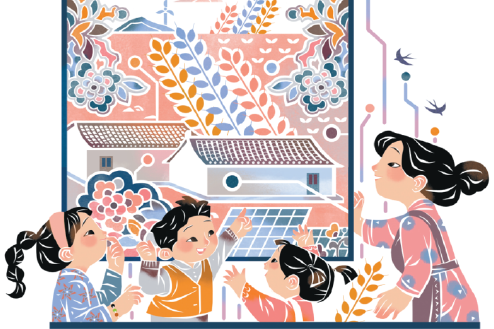Multilateral cooperation to help tackle challenges


Since the establishment of the Forum on China-Africa Cooperation in 2000, institutionalized cooperation between China and African countries has not only deepened but also extended to organizations and platforms such as the United Nations, the Belt and Road Initiative and the Non-Aligned Movement, reflecting the ever increasing importance and benefits of multilateralism.
And since the COVID-19 pandemic-induced global economic recession has made global connectivity all the more important, the future direction of China-Africa cooperation is bound to be multilateralism. Yet to ensure cooperation is truly mutually beneficial, the two sides should be aware of the challenges they face.
The first challenge is the impact of unilateralism on Sino-African cooperation and global economic development. Thanks to globalization and multilateralism, Africa's economic growth has accelerated over the past 20 years. But rising unilateralism and trade protectionism-which some economies have resorted to-may disrupt the global industrial, value and supply chains and therefore global trade, pushing Africa into a more disadvantageous position vis-à-vis the world economy.
The "America first" policies of the United States, the flag-bearer of unilateralism and trade protectionism, may cause price hikes in the international market, which in turn could destabilize African countries' fiscal policies and exchange rates, and undermine their economies.
The International Monetary Fund Annual Report 2019 argues that trade tensions between major economies hinder global trade and GDP growth. And unilateralism and protectionism will cause far more harm to developing countries and regions, including China and African countries, than to developed economies.
The second challenge China and African countries face is the West's criticism of Sino-African cooperation. The West has been using distortions and baseless accusations as political tools to hinder the development of Sino-African relations not only to prevent China from benefiting from Sino-African cooperation but also to stall the development of Africa so that the continent remains under the West's sphere of influence.
Turning a blind eye to the achievements of China-Africa relations, some Western states have been spreading rumors that China is in Africa to "grab resources" like a "neocolonial" power. To some extent, the slanderous campaign has caused misunderstandings between China and some Africa countries and created public opinion against the development of China-Africa relations in the international community.
The third challenge is inadequate bilateral exchanges and understanding between China and African countries. Although China and Africa share similar historical experiences and development tasks, there is still room for improvement. For example, language is still an obstacle for Chinese companies to operate in Africa, which could cause misunderstandings affecting economic cooperation.
It is therefore important for China and Africa to overcome such obstacles to ensure long-term development and synergize China's development goals with the African Union 2063 agenda. They could do so, for instance, by promoting policy coordination and strengthening cultural exchanges under the Belt and Road Initiative framework.
Issues such as cooperation on production capacity, agriculture and education can be addressed by improving communication and holding consultations based on equality to strengthen bilateral ties between China and African countries.
Although tackling unilateralism is a big, long-term challenge for China and Africa, none of the above challenges can be overcome by China and Africa alone. The only effective way to meet the challenges is to aggressively promote multilateralism, and take measures to strengthen China-Africa cooperation to such an extent that it becomes an example for the world and the driving force for building a community with a shared future for mankind.
A good start was made at the 2018 FOCAC summit through the Beijing Declaration, which advocates building an even stronger China-Africa community with a shared future, promotes a global governance system based on consultation, joint contribution and shared benefits, and sets a higher goal for China-Africa cooperation while opposing unilateralism and protectionism in all forms.
At the recent Fifth Plenary Session of the 19th Communist Party of China Central Committee, the top leaders reiterated their pledge to further open up China's economy and expand win-win cooperation, including promoting the Belt and Road Initiative and contributing to the reform of the global governance system.
China has also adopted an overall development plan for the 14th Five-Year Plan (2021-25) period with the aim to strengthen the "dual circulation" development paradigm which is centered on the "inner circulation" (or domestic economy) and aimed at integrating the inner circulation with the "outer circulation" (global economy) to develop new advantages for China in global cooperation and competition.
And as President Xi Jinping said at the opening ceremony of the 3rd China International Import Expo, China will pursue bilateral, multilateral and regional cooperation.
China and Africa need to make more joint efforts, including political efforts, to promote multilateralism on platforms such as the UN General Assembly, UN Security Council, World Trade Organization and the World Health Organization. They should also try to unite the developing countries to use multilateral cooperation as a political tool to counter unilateralism and better protect developing countries' right to development and life.
To deepen and widen multilateral cooperation, China and Africa should focus on building higher-level mechanisms and frameworks for cooperation.
Also, the extended partners of China-Africa cooperation, along with South-South and North-South organizations and cooperative mechanisms, should be included in the FOCAC cooperation framework including the UN and its different organizations, the Forum of China and Community of Latin American and the Caribbean States, China-Arab States Cooperation Forum, BRICS, Shanghai Cooperation Organization, Group of 77 and the G20. They could also be included in FOCAC's specific plans and projects to promote overall cooperation.
The objective is to build a solid framework for strengthening coordination and cooperation between countries and eventually establish a multilateral cooperation mechanism covering a wider area and increase capability to boost global cooperation.
The author is a researcher at the China-Africa Institute, Chinese Academy of Social Sciences. The views don't necessarily represent those of China Daily.
If you have a specific expertise and would like to contribute to China Daily, please contact us at [email protected] , and [email protected]


































